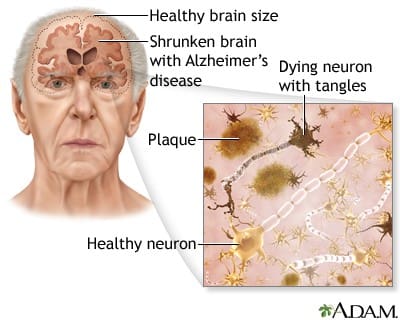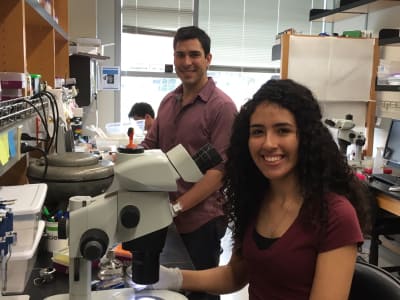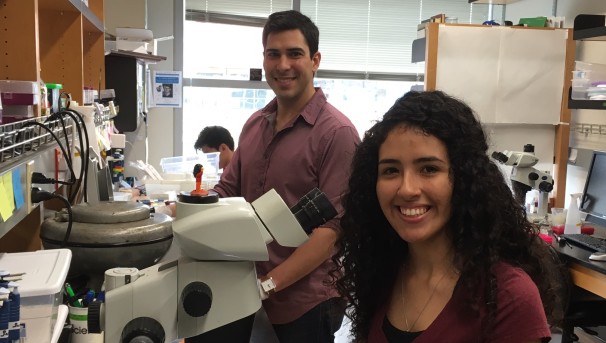This project is now in update mode. Check back regularly to see how things are progressing.
Help Students to Discover Treatments for Alzheimers
Alzheimer's disease: No treatment, no cure
Since it is the most common form of dementia, you probably know someone suffering from Alzheimer's disease. This is not only a terrible condition, but Alzheimer's also represents the 6th leading cause of death in the US. Tragically, there is no way to cure, slow down, or even prevent Alzheimer’s disease! Without any effective treatments, we all face a future with Alzheimer's disease growing from 4 million to 20 million patients in the next few decades.
What causes Alzheimer's disease?
Alzheimer's disease starts with the build up of toxic peptides from the APP molecule. These peptides accumulate into plaques outside of brain cells and trigger TAU tangles inside of brain cells. The toxic APP peptides and tangles interfere with brain function -- especially memory. Slowly, a wave degeneration sweeps throughout the brain causing memories to slip away, mood to destabilize, and eventually motor function to collapse.

Over the past two decades, researchers have mainly focused on finding ways to eliminate the plaques in the brains of Alzheimer’s patients. Some have succeeded, but these approaches have so far proven fruitless in treating Alzheimer’s disease
UT students fight Alzheimer's disease with research
Our research lab in the UT Austin’s Center for Learning and Memory is taking an innovative alternative approach to Alzheimer’s research. Most researchers use mice to study Alzheimer's disease. While useful, mouse research is slow because mice take two years to grow old. Our lab instead uses an unlikely animal model -- a tiny worm. We engineered a worm to carry human Alzheimer’s genes and found that some of its neurons die after only one week when they reach old age. This means that we can test a drug or genetic treatment on Monday and know the answer by Friday. With this worm model, we have already discovered several drugs that stop neurons from dying and also boost cognition in mouse models of Alzheimer’s disease.
We are now ready to tackle one of the biggest mysteries in Alzheimer's disease. Students in the Pierce lab will investigate how the two main culprits in Alzheimer’s disease called APP and APOE4 synergize to kill neurons in the brain. Most Alzheimer’s patients carry this unlucky APOE4 gene; however, scientists have no idea how this raises risk of Alzheimer’s disease. The Pierce lab will provide answers by leveraging their rapid new approach to uncover the mysterious molecular basis of APOE4 toxicity.

Together let's defeat Alzheimer's disease!
Please join us in our goal of empowering UT students to prevent neurodegeneration in Alzheimer’s disease. Tax-deductible donations raised for this project will fund summer salary support for UT undergrads in a series of life-changing summer research internships. Under the guidance of our expert researchers, UT students will become the leading Alzheimer's disease researchers of tomorrow!! We need your help to make this happen! Thank you!!
$10
Worm buster
Named for the surprising side effect of developing Alzheimer's disease in worms. In humans, Alzheimer's kills neurons important for memory. In worms, it kills neurons important for laying eggs. Without these neurons, babies hatch inside their moms. By encouraging your friends to donate $10 with your own donation will combine to make big impact in Alzheimer's research.
$25
Plaque preventer
Named for the aggregates of toxic peptides in the brains of Alzheimer's patients, a $25 gift paves the way towards our successful undergraduate research training program.
$50
Speedway Spirit
Named for the street by our research lab in the Neuromolecular Science lab, $50 provides enough support for undergraduates to purchase essential supplies such as pipettes and Petri dishes for Alzheimer's experiments.
$100
Littlefield leader
Named after the café where our students caffeinate for morning and late night experiments. $100 provides funds to test 50 new drugs to test on our Alzheimer's model.
$250
Longhorn legend
Named for our beloved mascot, $250 provides critical reagents used to study the difference between peptides in vulnerable and resistant neurons in Alzheimer's disease. Donors will receive an easy-to-understand update on current Alzheimer's disease research.
$500
Synapse supporter
Named for the connections between neurons that become dysfunctional in Alzheimer's disease, $500 provides a full month of summer salary support to one undergraduate student to conduct research. Donors will be invited to receive a personal tour of our lab to see research in action.
$1,000
Alois Advocate
Named for the remarkable researcher Alois Alzheimer's, who first characterized the disease in 1906, $1000 provides salary support for an undergraduate students as well as our Research Associate to provide expert training in Alzheimer's research. Donors will be invited to receive a personal tour of our lab to see research in action, and will receive an easy-to-understand update on current Alzheimer's disease research.
$2,000
APOE Adventurer
Named for the major risk factor in Alzheimer's disease, a $2000 donation would provide a full summer worth of salary for an undergraduate for research training. Donors at this level will be invited to receive a personal tour of our lab to see research in action, will receive an easy-to-understand update on current Alzheimer's disease research, and will get to try some Alzheimer's disease experiments themselves as "researcher for an afternoon".
$5,000
Alzheimer's Avenger
Generous donations at this $5000 level will allow undergrads in our lab to complete a screen for new drugs that may stop the death of neurons caused by toxic Alzheimer's proteins. Donors at this level will be invited to receive a personal tour of our lab to see research in action, will receive an easy-to-understand update on current Alzheimer's disease research, and will get to try some Alzheimer's disease experiments themselves as "researcher for an afternoon". Moreover, they will have a gene named after them that when mutated reduces Alzheimer's risk.






